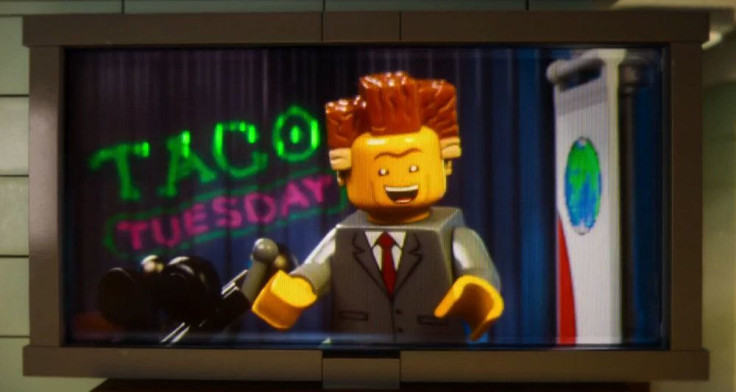How 'The Lego Movie' And 'Everything Is Awesome' Parody Creeping Everyday Fascism

Last Friday, critics and fans alike were stunned when “The Lego Movie,” expected to be a 90-minute commercial for children’s toys, turned out to be an inventive, well-written adventure for all ages. One of “The Lego Movie’s” most tellingly brilliant moments comes in the form of its faux pop song “Everything is Awesome,” performed by Tegan and Sara and the Lonely Island.
We’re introduced to “Everything is Awesome” at the beginning of the film, as everyman protagonist Emmet Brickowski (Chris Pratt) is inundated with a stream of inane pop culture produced by Lord Business (Will Ferrell). Lord Business wants to preserve the Lego world exactly how he thinks it should be, and he uses bland pop artifacts like “Everything is Awesome” and a sitcom called “Where Are My Pants?” to keep the Lego populace mindlessly moving through their lives.
At first glance, “Everything is Awesome” seems little more than an infectiously catchy parody of watered-down radio pop, right down to the faux-dubstep breakdown. There’s a lot more happening under the surface, however. Namely, “Everything is Awesome” casually embraces fascism in the service of Lord Business’ plans to keep the world exactly as he believes it should be.
Pay attention to the lyrics:
“Everything is cool when you're part of a team.” “Everything is better when we stick together.” “Side by side, you and I gonna win forever.” “We're the same, I'm like you, you're like me, we're all working in harmony.” “Lost my job, it's a new opportunity / More free time for my awesome community.” “A Nobel Prize, a piece of string / You know what's awesome? Everything!”
What the words are really saying is: Don’t focus on your problems because everything is great. Stay in line with other people just like you. Nothing is more special than anything else. Most importantly, always be a “team player.” The lyrics aren’t just a generic call for teamwork and positive thinking, they’re Lord Business’ call for conformity and consumerism, nothing short of a reminder of the fascist regimes of the 20th century, which prized conformity and enthusiasm (think Hitler's "Strength Through Joy" program) above all else.
Of course, directors Phil Lord and Chris Miller planned it this way. The duo are no strangers to smart satire, having also used their short-lived 2002 MTV show “Clone High” to skewer then-popular melodramas like “Dawson’s Creek.” Lord and Miller seem to have deliberately crafted “Everything is Awesome” as a reflection on corporate control, which makes the song — and “the Lego Movie” itself — so brilliant.
The word fascism was coined by Benito Mussolini to refer to the ancient Roman symbol of a bundle of sticks tied together to reinforce their strength, and “Everything is Awesome” intentionally plays on that imagery. The song repeatedly downplays individual listeners in favor of an unspecified “team” and encourages them to do everything they can for their “team” rather than themselves. “Everything is Awesome” serves to push Lego citizens to continue on in their miserable jobs and buy $30 coffees just as surely as it makes real-life moviegoers sing along. It’s a tremendously effective song.
Therein lies the essential genius of "Everything is Awesome": It takes modern radio homogeneity to its logical extension and knowingly creates a pop hit celebrating cultural goose-stepping. The song gives a tangible weight to Lord Business’ desire for control over the Lego World and his desire for homogeneity, but it also comments on the real world.
As unsettling as the lyrics can be in the context of the film, though, “Everything is Awesome” isn’t just a light joke on fascism. It’s an example of the way fascist thinking can creep into everyday life. Fascism and musical numbers have a long history together. From the beginning, Nazi Germany used propaganda songs to stir its citizens into mindless collective action. Propaganda Minister Joseph Goebbels himself was once quoted as saying, "Music affects the heart and emotions more than the intellect.”
Decades later, though, fascist songwriting truly came into its own in the Democratic People’s Republic of Korea, proving that this sort of fascism isn't confined to far-right ideology.
North Korean propagandists have been using Western-style pop songs as tools to reinforce their political agenda for years. Because Kim Il-Sung and his descendants have maintained total control over North Korean media for decades, many of their efforts have been extremely successful in the isolated nation.
Some songs, like “The Dear General Uses Distance-Shrinking Magic,” flaunt their worship on their sleeve. Others, like “Reunification Rainbow,” express desire for a reunited Korea while denying any culpability in the peninsula’s continued division.
Odd titles aside, few North Korean songs are as manipulatively fascist as “Don’t Ask My Name.” The 1990s song, apparently still popular in North Korea, describes a woman who makes a great achievement but declines to tell a journalist her name. She insists that factory workers are the real North Korean heroes. It’s the perfect anthem for giving up your very name to further a faceless government agenda. And by all accounts, it works.
No matter the regime in question, the basic building blocks at play are the same. A powerful leader (whether it’s Hitler, Kim Jong-Un or Lord Business) insists on rigid sameness of his populace and uses seemingly innocuous songs to reinforce that message. “The Lego Movie’s” Lord Business may not opt for North Korea’s sentimentalism in “Everything is Awesome,” but he still uses popular trends to subtly send out messages of conformity.
Of course, Lord and Miller mean their example as satire, but good satire has to stick closely to the real thing. By the time “The Lego Movie” let out, kids were shouting the words to “Everything is Awesome.” The same could happen with a song that doesn’t see itself as parody.
© Copyright IBTimes 2024. All rights reserved.






















